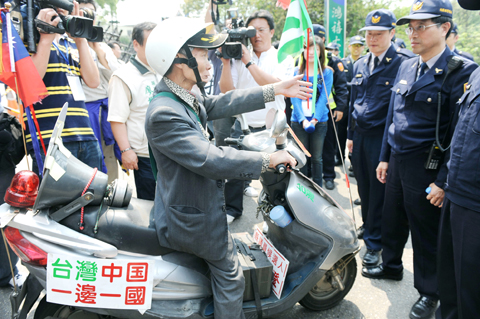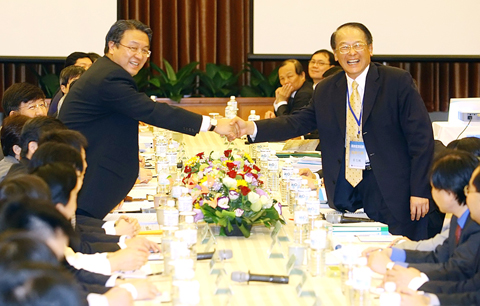The second round of negotiations on a proposed economic cooperation framework agreement (ECFA) with China opened yesterday in Dasi (大溪), Taoyuan County, amid scuffles between police and protesters who accused the government of attempting to sell out Taiwan.
The first of the two-day negotiations yesterday focused on the “early harvest” items proposed for traded goods and services, as well as regulations on the labeling of product origin and the text of the proposed ECFA.
The “early harvest” list refers to a list of goods and services that will be subject to immediate tariff concessions or exemptions, which are expected to form the backbone of the proposed deal.

PHOTO: LO PEI-DER, TAIPEI TIMES
Bureau of Foreign Trade Director-General Huang Chih-peng (黃志鵬), the head of the Taiwanese delegation, said negotiations on the text were almost done, and the two sides would continue discussions on the early harvest items and product origin labels today.
“The two sides exchanged ideas and had deep discussions on the impact of an ECFA on industries on both sides. Our stances are getting closer, and we will continue the negotiations with sincerity and flexibility,” he said in a press briefing after a full-day of negotiation at Ta Shee Resort in Dasi.
Huang said the Taiwanese delegation reiterated its stance on limiting imports of Chinese agricultural products and not opening the market to Chinese workers.

PHOTO: CNA
Taiwan also stressed that it would not consider including traditional industries on the early harvest list and would protect the interests of small and medium businesses, he said.
Machinery, textiles, petrochemicals, as well as automobiles and related components, are expected to be on Taiwan's early harvest list. The two sides also discussed service businesses that could be included in the list.
Huang declined to comment whether the Taiwanese delegation made any compromises on the list during the negotiations. He said the delegation requested that China consider the difference in the scope of the markets and industries on both sides when negotiating items.
Straits Exchange Foundation (SEF) Vice Chairman Kao Koong-liang (高孔廉) said later yesterday during a dinner banquet for the Chinese delegation that Taiwan would make sure that traditional industries would not be affected after the ECFA is signed.
Tang Wei (唐煒), head of the Department of Taiwan, Hong Kong and Macau under China's Ministry of Commerce, said the two sides would seek to reach consensus on the early harvest list based on the principle of “fast, easy and less” — dealing with easy issues before contentious ones, and limiting the scope of the early harvest list so that a consensus can be reached soon.
“[An] ECFA is neither a panacea nor a curse ... We will put the interests of the general public and local business into consideration in negotiating an ECFA,” he said.
Promoting the benefits of an ECFA, Tang said 271 free-trade agreements had been signed around the world but no country had been marginalized as a result of these pacts.
Early yesterday morning, about 100 protesters arrived from nearby towns and cities to protest outside the venue of the meeting, saying the controversial agreement would pave the way for eventual unification with China.
Hundreds of police officers — some in full riot gear — set up barricades and closed down roads, turning the quaint countryside resort into what some protesters likened to “a military camp.”
Several rounds of clashes later took place as protesters attempted to break through the barbed wired barricades and police guarding entry into the resort.
The protesters dispersed at noon following repeated warnings by police, but gathered again early in the afternoon, yelling slogans and burning Chinese flags.
“President Ma Ying-jeou (馬英九) and the ECFA are selling Taiwan out,” “Taiwan and China are two different countries” and “ECFA needs a nationwide referendum,” the crowd chanted.
The clashes were the latest in a long string of headaches for the government which has expressed optimism that it can complete negotiations on the agreement before the end of June.
The timing and location of yesterday's talks were heavily criticized by the opposition after the government only announced the venue on Monday — two days before the start of the negotiations.
DPP legislators said the remote location was chosen to limit the amount of protesters at the scene, while other said the Ma government was downgrading Taiwan's status by deciding not to hold the meeting in Taipei.
The two sides held the first round of negotiations in January in Beijing.
Kao said the SEF chose to hold the event outside Taipei “purely because we could not find enough rooms for delegation members in the city,” as the timing of the negotiations was not determined until several days ago.
Although, no serious injuries were reported at press time, several protest organizers later alleged there had been instancesof police brutality. A group of Taoyuan County DPP councilors said they were hit by police officers during the morning scuffles.
DPP headquarters, however, rejected reports that it was involved in the protests, saying it did not have plans to launch protests over the trade agreement.
“It's too early to talk about protests. The DPP will discuss such actions pending the outcome of the government's attitude on holding an ECFA debate and nationwide referendum,” DPP Chairperson Tsai Ing-wen (蔡英文) said.
The DPP has accused the Ma administration of ignoring public opinion after the government rebuffed its earlier calls to hold a referendum on the proposed pact. A recent poll conducted by the DPP showed that 45.8 percent of respondents were against signing the proposal, while 34.9 percent supported it.
Critics oppose the ECFA amid fears that it would jeopardize Taiwan's sovereignty and make it too economically dependent on China.
Both the DPP and the Taiwan Solidarity Union have been pushing for a referendum on the issue.
Sources from the DPP said that Presidential Office Secretary-General Liao Liou-yi (廖了以) would meet DPP Secretary-General Su Jia-chyuan (蘇嘉全) at an undisclosed location today to hammer out details on the upcoming talks between Ma and Tsai.
The DPP has called for a “debate” on the proposed ECFA, but the Presidential Office said it would prefer a “discussion” of the issue.

SECURITY: As China is ‘reshaping’ Hong Kong’s population, Taiwan must raise the eligibility threshold for applications from Hong Kongers, Chiu Chui-cheng said When Hong Kong and Macau citizens apply for residency in Taiwan, it would be under a new category that includes a “national security observation period,” Mainland Affairs Council (MAC) Minister Chiu Chui-cheng (邱垂正) said yesterday. President William Lai (賴清德) on March 13 announced 17 strategies to counter China’s aggression toward Taiwan, including incorporating national security considerations into the review process for residency applications from Hong Kong and Macau citizens. The situation in Hong Kong is constantly changing, Chiu said to media yesterday on the sidelines of the Taipei Technology Run hosted by the Taipei Neihu Technology Park Development Association. With

CARROT AND STICK: While unrelenting in its military threats, China attracted nearly 40,000 Taiwanese to over 400 business events last year Nearly 40,000 Taiwanese last year joined industry events in China, such as conferences and trade fairs, supported by the Chinese government, a study showed yesterday, as Beijing ramps up a charm offensive toward Taipei alongside military pressure. China has long taken a carrot-and-stick approach to Taiwan, threatening it with the prospect of military action while reaching out to those it believes are amenable to Beijing’s point of view. Taiwanese security officials are wary of what they see as Beijing’s influence campaigns to sway public opinion after Taipei and Beijing gradually resumed travel links halted by the COVID-19 pandemic, but the scale of

A US Marine Corps regiment equipped with Naval Strike Missiles (NSM) is set to participate in the upcoming Balikatan 25 exercise in the Luzon Strait, marking the system’s first-ever deployment in the Philippines. US and Philippine officials have separately confirmed that the Navy Marine Expeditionary Ship Interdiction System (NMESIS) — the mobile launch platform for the Naval Strike Missile — would take part in the joint exercise. The missiles are being deployed to “a strategic first island chain chokepoint” in the waters between Taiwan proper and the Philippines, US-based Naval News reported. “The Luzon Strait and Bashi Channel represent a critical access

Pope Francis is be laid to rest on Saturday after lying in state for three days in St Peter’s Basilica, where the faithful are expected to flock to pay their respects to history’s first Latin American pontiff. The cardinals met yesterday in the Vatican’s synod hall to chart the next steps before a conclave begins to choose Francis’ successor, as condolences poured in from around the world. According to current norms, the conclave must begin between May 5 and 10. The cardinals set the funeral for Saturday at 10am in St Peter’s Square, to be celebrated by the dean of the College